The UW-Madison Black Cultural Center — an identity center within the Multicultural Learning Center — is honoring Black History Month with a slew of events in their series, “Music as Medicine: Evolution of Music in the Black Community.”
Throughout February, the university is hosting a series of events that highlight the rich history and influence of music in the Black community, as well as its role in activism, healing and freedom of expression.
Featured art, radio and documentary galleries are listed among the university events planned for the month. Events are open to the public.
And, amid special university recognition of Black History Month, student organizations and leaders continue to advocate for Black students across campus every day.
The UW-Madison BIPOC Coalition is one student group advocating for the voices of students often left out of decision-making processes at the university level, including Black students. In honor of Black History Month, the coalition is highlighting the accomplishments of Black artists, activists, creatives and intellectuals — both past and present — on social media. They are also hosting a variety of virtual events, including a concert featuring local Black musicians on Feb. 27, among others.
All the while, the coalition continues to advocate for the BIPOC student voice.
Jordan Kennedy, a UW-Madison junior and co-founder of the UW-Madison BIPOC Coalition, stressed that Black History Month is a time to recognize history and talk about issues facing not only African-Americans but Africans that are often misinterpreted or not discussed in-depth with many Americans. Kennedy highlights that the organization’s continual advocacy for large-scale change in conjunction with honoring Black stories this month is critical.
According to Kennedy, the coronavirus pandemic only heightened and intensified issues relating to the acknowledgment of student voices at a university level.
“With the pandemic, everything becomes more transparent and everything gets heightened and becomes more intense,” said Kennedy. “Overall the administration’s lack of desire to hear from students has really shown through.”
Issues ranging from housing insecurity to telecommuting policy among socially marginalized groups have been at the forefront of recent discussions on campus, and the BIPOC Coalition has worked closely with the Associated Students of Madison (ASM) and other student groups to advocate for the livelihoods of all UW-Madison students.
ASM is currently working to establish a COVID-19 relief fund for students but is locked in a heated debate over the fund with university officials.
According to Kennedy, diverging opinions between students and the university, especially in the context of COVID-19, do not deserve to be labeled as a “disagreement.” This is due to students not truly having an “equal voice at the table” and needing to “beg and plea” with administrators during important conversations and decision-making processes relating to their cause, Kennedy said.
When there is a “roadblock” in the coalition and other student groups’ advocacy, the university doesn’t provide sufficient resources and more options to work through it; they provide “more reasons as to why we can’t do it,” according to Kennedy, emphasizing that he doesn’t believe that student voices are truly heard.
UW-Madison Sophomore and BIPOC at Wisco Instagram account Founder Djamal Lylecyrus reiterated Kennedy’s concerns.
“From working with the UW-Madison BIPOC Coalition, I have seen how difficult it is to get cooperation from the administration in terms of meetings and I haven’t had the luxury to get one,” said Lylecyrus, whose BIPOC at Wisco feed directly aims to highlight the experiences and thoughts of BIPOC students on campus.
“I want the university to have integrity in their words,” Lylecyrus said. “Because I’m continuing to see this tokenization of social justice work, across the board.”
The “tokenization” was prominent during events this past summer involving University Health Services (UHS) and their use of police escorts when dealing with mental health crises, Lylecyrus said.
He feels that the summer press release describing UHS intent to reconsider its relationship with campus police when dealing with students experiencing mental health crises was deceptive in the sense that actual action against this relationship was not taken up until last month, and by ASM — not the university administration itself.
ASM recently passed legislation that would create a budget placeholder, allowing for the creation of a Crisis Response Team to be used in related situations.
The university released a statement last month explaining that UHS, the UW Police Department (UWPD) and other departments within the university will work to improve mental health services and the handling of emergencies relating to mental health. The passage of legislation supporting a Crisis Response Team on campus later that same week indicates that student groups such as ASM still believe not enough has been done.
Ultimately, student leaders like Kennedy and Lylecyrus want the voices of BIPOC students to be heard and utilized by university officials when engaging in important discussions and making decisions.
Black History Month may take place during the month of February, but the voices of Black students, as well as the voice of other students of color, remain critical in the conversations and decision-making processes that impact the livelihoods of all students on campus.
“I think that every month is Black History Month,” said Lylecyrus, emphasizing the importance of understanding historical contexts that have shaped society when striving for progress. “We [BIPOC individuals] get that the university and America altogether ‘hear us’ but at this point, we need society to listen to us.”
Sophia Vento is a former editor-in-chief of The Daily Cardinal. She previously served as the college news editor. She has covered breaking, campus, city, state and sports, and written in-depth stories about health, culture and education. She previously interned with the Milwaukee Journal Sentinel. Any newsroom would be lucky to have Sophia on staff. Follow her on Twitter at @sophiasvento.






